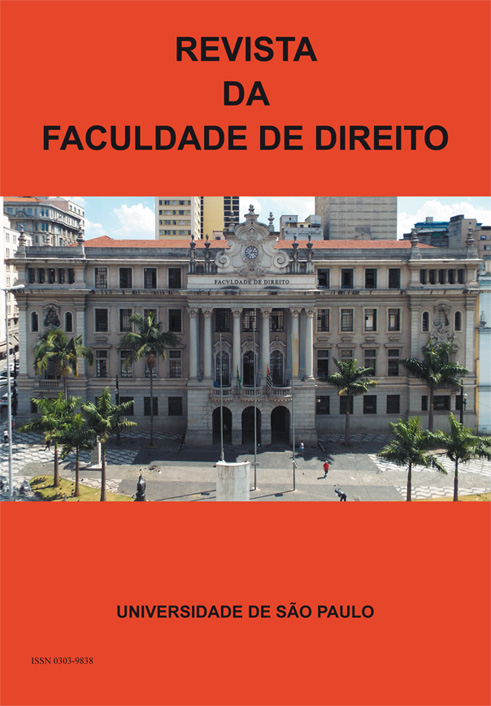Artificial intelligence and personality rights: a contradiction in terms?
DOI:
https://doi.org/10.11606/issn.2318-8235.v113i0p133-149Keywords:
Artificial Intelligence, Personality rights, Right to privacy, Internet, Social controlsAbstract
Artificial intelligence has developed concomitant with electronics and computer science since the 1950s. It has been increasingly applied in the most diverse areas, enhanced due to the huge capacity of data storage and traffic over the Internet. However, in 2018, society’s perception of the positive and negative effects of the use of artificial intelligence, not only from a political point of view, but also from the personality rights, especially the right to privacy, was broadened. In this paper, the author made a presentation of artificial intelligence, the problems that it can cause to the people and the challenges of the rights of the personality in the defense of the human dignity.
Downloads
References
ALISSON, Elton. “Internet dos animais” entrará em operação em 2019. Agência FAPESP, São Paulo, 30 nov. 2018. Disponível em: <http://agencia.fapesp.br/internet-dos-animais-entrara-em-operacao-em-2019/29317/>. Acesso em: 2 dez. 2018.
ALVES, Gabriel. Inteligência artificial supera médicos ao ver exames de imagem. Folha de S.Paulo, São Paulo, 22 fev. 2018. Equilíbrio e Saúde. Disponível em: <https://www1.folha.uol.com.br/equilibrioesaude/2018/02/inteligencia-artificial-supera-medicos-ao-ver-exames-de-imagem.shtml>. Acesso em: 19 nov. 2018.
AUTRAN, Felipe. IBM patenteia tecnologia para usar inteligência artificial em semáforos. Tecmundo, Curitiba, 18 maio 2018. Disponível em: <https://www.tecmundo.com.br/software/130423-ibm-patenteia-tecnologia-usar-inteligencia-artificial-semaforos.htm>. Acesso em: 19 nov. 2018.
BERGEN, Mark. Google treina máquinas para prever quando um paciente vai morrer. UOL Notícias, São Paulo, 18 jun. 2018. Disponível em: <https://tecnologia.uol.com.br/noticias/bloomberg/2018/06/18/google-treina-maquinas-para-prever-quando-um-paciente-vai-morrer.htm>. Acesso em: 19 nov. 2018.
BLOUSTEIN, Edward J. Privacy as an aspect of human dignity: an answer to Dean Prosser. New York University Law Review, New York, v. 39, p. 962-1.007, 1964.
BRASIL. Ministério da Educação. Instituto Nacional de Estudos e Pesquisas Anísio Teixeira. Exame Nacional do Ensino Médio. Prova de linguagens, códigos e suas tecnologias e redação. Prova de ciências humanas e suas tecnologias. 2018a. Disponível em: . Acesso em: 19 nov. 2018.
BRASIL. Ministério da Indústria, Comércio e Serviços. Agenda brasileira para a Indústria 4.0. Disponível em: <http://www.industria40.gov.br>. 2018. Acesso em: 19 nov. 2018.
BRASIL. Superior Tribunal de Justiça. STJ e Enfam lançam Corpus927, sistema para agrupar e ordenar a jurisprudência dos tribunais. Brasília, 21 jun. 2018b. Disponível em: <http://www.stj.jus.br/sites/STJ/default/pt_BR/Comunica%C3%A7%C3%A3o/noticias/Not%C3%ADcias/STJ-e-Enfam-lan%C3%A7am-Corpus927,-sistema-para-agrupar-e-ordenar-a-jurisprud%C3%AAncia-dos-tribunais>. Acesso em: 19 nov. 2018.
BRASIL. Supremo Tribunal Federal. Inteligência artificial vai agilizar a tramitação de processos no STF. Brasília, DF, 30 maio 2018c. Disponível em: . Acesso em: 19 nov. 2018.
BROWN, Jennings. IBM Watson teria recomendado tratamentos contra câncer “inseguros e incorretos”. Gizmodo, São Paulo, 25 jul. 2018. Disponível em: <https://gizmodo.uol.com.br/ibm-watson-saude-recomendacao-tratamentos-cancer-inseguros-incorretos/>. Acesso em: 19 nov. 2018.
BRUNDAGE, Miles et al. The malicious use of artificial intelligence: forecasting, prevention, and mitigation. Cambridge: University of Cambridge, 2018. Disponível em: <https://www.repository.cam.ac.uk/handle/1810/275332>. Acesso em: 19 nov. 2018.
CISCATI, Rafael. Dados médicos de 1,6 milhão de paulistanos serão usados em software de inteligência artificial. O Globo, Rio de Janeiro, 26 ago. 2018. Sociedade. Disponível em: <https://oglobo.globo.com/sociedade/dados-medicos-de-16-milhao-de-paulistanos-serao-usados-em-software-de-inteligencia-artificial-23010203>. Acesso em: 19 nov. 2018.
FLORESTI, Felipe. Inteligência artificial entra no jogo da política. Mas isso é bom? Galileu, São Paulo, 27 fev. 2018. Disponível em: <https://revistagalileu.globo.com/Revista/noticia/2018/02/inteligencia-artificial-entra-no-jogo-da-politica-mas-isso-e-bom.html>. Acesso em: 19 nov. 2018.
GANASCIA, Jean-Gabriel. A inteligência artificial. Tradução de Reginaldo Carmello Corrêa de Moraes. São Paulo: Ática, 1997.
GARDNER, Howard. Inteligências múltiplas: a teoria na prática. Tradução de Maria Adriana Veríssimo Veronese. Revisão técnica de Maria Carmen Silveira Barbosa. Porto Alegre: Artes Médicas, 1995.
GOMI, Edson Satoshi. Robôs são usados para divulgar notícias falsas na internet. Jornal da USP, São Paulo, 16 out. 2017. Disponível em: <https://jornal.usp.br/atualidades/robos-sao-usados-para-divulgar-noticias-falsas-na-internet/>. Acesso em: 19 nov. 2018.
HARARI, Yuval Noah. 21 lições para o século 21. Tradução Paulo Geiger. São Paulo: Companhia das Letras, 2018.
MCCARTHY, John. Programs with common sense. [S. l.: s. n.], 1959. Disponível em: <http://www-formal.stanford.edu/jmc/mcc59.pdf>. Acesso em: 19 nov. 2018.
MICHAEL, Donald N. Speculations on the relation of the computer to individual freedom and the right to privacy. George Washington Law Review, Washington, DC, v. 33, n. 1, p. 272-286, Oct. 1964.
PICHETA, Rob. Passengers to face AI lie detector tests at EU airports. CNN Travel, Atlanta, 2 nov. 2018. Disponível em: <https://edition.cnn.com/travel/article/ai-lie-detector-eu-airports-scli-intl/index.html>. Acesso em: 19 nov. 2018.
POLANI, Daniel. “Alô, aqui é um robô sem sentimentos nem empatia”. A substituição de pessoas por máquinas no atendimento ao cliente é uma notícia ruim para os usuários. El PAÍS, Madrid, 8 set. 2017. Disponível em: <https://brasil.elpais.com/brasil/2017/09/05/tecnologia/1504632657_445116.html>. Acesso em: 19 nov. 2018.
RICH, Elaine. Inteligência artificial. Tradução de Newton Vasconcellos; Revisão Técnica de Nizam Omar. São Paulo: McGraw-Hill, 1988.
ROBÔS são usados para divulgar notícias falsas na Internet. Jornal da USP, São Paulo, 16 out. 2017. Atualidades. Disponível em: <https://jornal.usp.br/atualidades/robos-sao-usados-para-divulgar-noticias-falsas-na-internet/>. Acesso em: 19 nov. 2018.
RUSSELL, Stuart. Jonathan; NORVIG, Peter. Artificial intelligence: a modern approach. New Jersey: Prentice-Hall, 1995.
TAFNER, Malcon Anderson; XEREZ, Marcos de; RODRIGUES FILHO, Ilson Wilmar. Redes neurais artificiais: introdução e princípios de neurocomputação. Blumenau: Eko e FURB, 1996.
TOMASEVICIUS FILHO, Eduardo. A natureza jurídica do software à luz da lingüística. Revista da ABPI, Rio de Janeiro, n. 79, p. 46-59, nov./dez. 2005.
TURING, Alan Mathison. Computing machinery and intelligence. Mind: a quarterly review of psychology and philosophy, Ann Arbor, v. 59, n. 236, p. 433-460, Oct. 1950.
UNIÃO EUROPEIA. Parlamento Europeu. Resolução do Parlamento Europeu, de 16 de fevereiro de 2017, que contém recomendações à Comissão sobre disposições de Direito Civil sobre Robótica (2015/2103(INL)). Estrasburgo, 2017. Disponível em: <http://www.europarl.europa.eu/sides/getDoc.do?pubRef=-//EP//TEXT+TA+P8-TA-2017-0051+0+DOC+XML+V0//PT#BKMD-12>.
WARREN, Samuel Dennis; BRANDEIS, Louis Dembitz The right to privacy. Harvard Law Review, Cambridge, v. 4, n. 5, p. 193-220, Dec. 1890.
WESTIN, Alan F. Privacy and freedom. New York: Atheneum, 1970.
Downloads
Published
Issue
Section
License
Copyright (c) 2018 Revista da Faculdade de Direito, Universidade de São Paulo

This work is licensed under a Creative Commons Attribution-NonCommercial-ShareAlike 4.0 International License.


